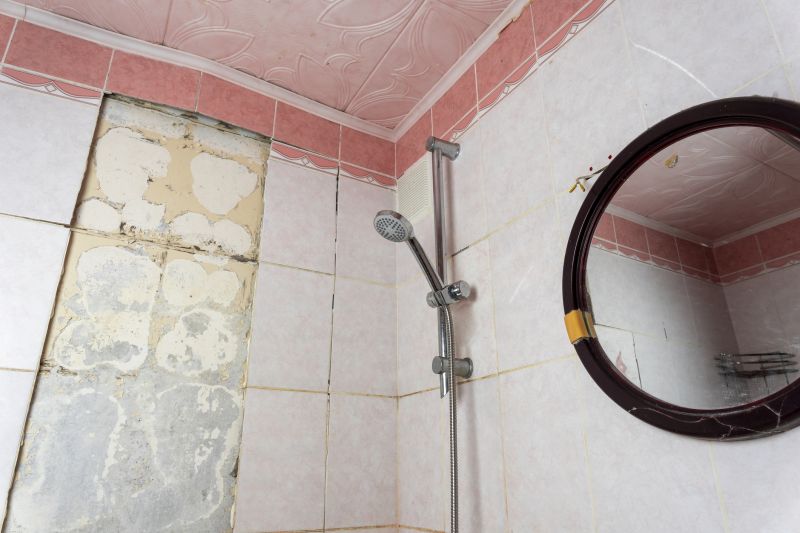Expert Picks for Shower Tile Repair Supplies and Tools
Get insights into top repair products that help you achieve durable and professional-looking shower tile fixes.
 Maintaining the integrity of shower tiles is essential for both the aesthetic appeal and the functionality of a bathroom. Over time, grout can crack, tiles may become loose, and surfaces might develop stains or mold. Addressing these issues promptly can prevent further damage and help preserve the appearance of your shower space. A variety of products are available to facilitate effective tile repairs, ranging from simple cleaning solutions to specialized repair compounds. Selecting the right tools and materials depends on the specific problem, the extent of damage, and the type of tiles involved.
Maintaining the integrity of shower tiles is essential for both the aesthetic appeal and the functionality of a bathroom. Over time, grout can crack, tiles may become loose, and surfaces might develop stains or mold. Addressing these issues promptly can prevent further damage and help preserve the appearance of your shower space. A variety of products are available to facilitate effective tile repairs, ranging from simple cleaning solutions to specialized repair compounds. Selecting the right tools and materials depends on the specific problem, the extent of damage, and the type of tiles involved.
Top Overall Option
Multi-Purpose Tile Repair Kit
A versatile and comprehensive repair kit designed to address various issues such as cracks, chips, and grout deterioration. It typically includes color-matched fillers, sealants, and tools for easy application, making it suitable for different tile types and damage levels. This type of kit offers a convenient all-in-one solution for DIY repairs, helping users achieve a professional-looking finish with minimal effort.
Types of Products For Shower Tile Repairs
Epoxy Tile Filler
A durable, chemical-resistant compound used to fill cracks and chips in tiles, providing a strong and lasting repair.
Grout Repair Caulk
Flexible sealants designed to fill and seal grout lines, preventing water infiltration and mold growth.
Tile Adhesive
Strong adhesive compounds used to reattach loose tiles securely to the wall or floor surface.
Color-Matched Repair Compound
Pre-mixed or customizable compounds that blend seamlessly with existing tiles for a nearly invisible repair.
Mold and Mildew Resistant Sealant
Specialized sealants formulated to resist mold and mildew growth, ideal for shower environments.
Tile Cleaning and Prep Solution
Cleaning agents that prepare the surface for repair by removing dirt, soap scum, and loose debris.
Flexible Repair Tape
Adhesive tapes used for temporary fixes or to hold tiles in place during curing.
Porcelain and Ceramic Tile Repair Paste
Specialized pastes formulated for porcelain and ceramic tiles to fill chips and cracks.
Grout Removal Tool
Tools designed to carefully remove old grout without damaging surrounding tiles, preparing for new grout application.
Tile Regrouting Kit
Complete kits that include grout, applicators, and sealers for regrouting entire sections of tile.
Silicone Sealant
Waterproof and flexible sealant ideal for sealing around shower fixtures and edges.
Hydrophobic Tile Sealant
Sealants that repel water and stains, helping to protect repaired surfaces over time.
Tile Repair Pen
Portable pens filled with color-matched repair compound for quick touch-ups and small chips.
Flexible Epoxy Putty
Malleable putty that can fill larger cracks and chips, adhering well to various tile surfaces.
Waterproof Grout Sealer
Sealer applied over grout lines to enhance water resistance and prevent staining.
Repair Patch for Tiles
Self-adhesive patches designed to cover larger damaged areas temporarily or permanently.
Popular Choices
Widely used for its strong bonding and durability in fixing cracks and chips.
Commonly chosen for sealing and repairing grout lines in shower areas.
Popular for reattaching loose tiles securely on various surfaces.
Favored for blending seamlessly with existing tile colors during repairs.
Frequently selected for its resistance to bathroom moisture and mold growth.
Essential for preparing surfaces prior to applying repair products.
Useful for temporary fixes or holding tiles in place during curing.
Popular for filling chips and cracks in porcelain and ceramic tiles.
Commonly used for removing old grout to prepare for regrouting.
Popular for redoing entire grout lines with matching color and sealant.
Widely used for sealing around fixtures and edges in showers.
Chosen for its water-repelling properties to prolong repair durability.
Convenient for quick touch-ups on small chips and cracks.
Preferred for filling larger cracks and irregular damages.
Popular for protecting grout lines from moisture and staining.
When considering repair products, it is important to assess the nature of the damage. Small cracks or chips might be adequately addressed with patching compounds, while extensive grout deterioration may require re-grouting or sealing. Proper surface preparation, including cleaning and removing loose debris, is crucial for successful repairs. Additionally, choosing products that are compatible with the existing tile and grout materials can enhance the longevity of the repair. Many repair kits now include easy-to-use applicators and color-matched compounds to help achieve a seamless finish.
For those looking to undertake repairs themselves, understanding the different types of products available can make the process more manageable. From epoxy-based fillers to flexible sealants, the options are diverse. It is also helpful to consider the ease of application, drying time, and whether the product is resistant to water and mold. Investing in high-quality repair materials can result in a more durable and visually appealing outcome, reducing the need for frequent touch-ups and maintaining the shower’s overall appearance.
Key Buying Considerations
- Type of damage and appropriate repair product
- Compatibility with existing tile and grout materials
- Ease of application and user experience
- Drying and curing times for the products
- Water resistance and mold/mildew resistance features
- Color-matching capabilities for seamless repairs
- Durability and longevity of the repair material
- Flexibility of the repair compound to accommodate movement
- Surface preparation requirements before application
- Sealing properties to prevent future damage
- Availability of repair kits versus individual products
- Price and value for the scope of the repair
- Brand reputation and customer reviews
- Environmental considerations, if any relevant
- Compatibility with shower surfaces such as porcelain, ceramic, or stone
